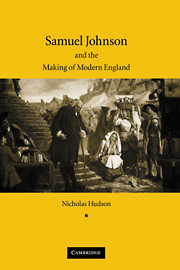Book contents
- Frontmatter
- Contents
- Acknowledgments
- Introduction
- 1 From “rank” to “class”: the changing structures of social hierarchy
- 2 Constructing the middle-class woman
- 3 From “Broad-bottom” to “party”: the rise of modern English politics
- 4 “The voice of the nation”: the evolution of the “public”
- 5 The construction of English nationhood
- 6 The material and ideological development of the British Empire
- Conclusion
- Notes
- Bibliography
- Index
4 - “The voice of the nation”: the evolution of the “public”
Published online by Cambridge University Press: 31 August 2009
- Frontmatter
- Contents
- Acknowledgments
- Introduction
- 1 From “rank” to “class”: the changing structures of social hierarchy
- 2 Constructing the middle-class woman
- 3 From “Broad-bottom” to “party”: the rise of modern English politics
- 4 “The voice of the nation”: the evolution of the “public”
- 5 The construction of English nationhood
- 6 The material and ideological development of the British Empire
- Conclusion
- Notes
- Bibliography
- Index
Summary
PUBLIC SPIRIT AND PRIVATE INTEREST IN A COMMERCIAL NATION
A leitmotif crossing through much that we have discussed so far has been the concept of the “public.” As we have seen, eighteenth-century debates surrounding the emergent middle class concerned, above all, the unprecedented access of middling-order people to the public spaces and public activities that had previously signalized the social privilege and seclusion of the aristocracy and upper gentry. If in a previous time, for example, gardens embellished with musicians and delicacies had existed only behind the great homes of the aristocracy, now the public gardens of Vauxhall, Ranelagh, and Marylebone emulated precisely this style, screening out only those who could not pay the moderate but still respectable admission charge. Similar financial barriers were set up at the doors of coffee-houses, which began as little more than courtyards that admitted patrons for a penny, but gradually became more self-consciously “genteel,” barring the riffraff and priding themselves on a specialized “elite” clientele. And although these caffeine-fueled zones of middle-rank discourse were widely regarded, it seems, as places of refuge from middle-rank wives, a new literate order of ladies had never before experienced such exposure to the public, had never been allotted such authority on issues of public taste and spending, and had never exercised such a liberty to express themselves publicly, even if the range of that expression was curtailed along lines that we notice because, for the first time, they existed at all.
- Type
- Chapter
- Information
- Samuel Johnson and the Making of Modern England , pp. 108 - 132Publisher: Cambridge University PressPrint publication year: 2003

